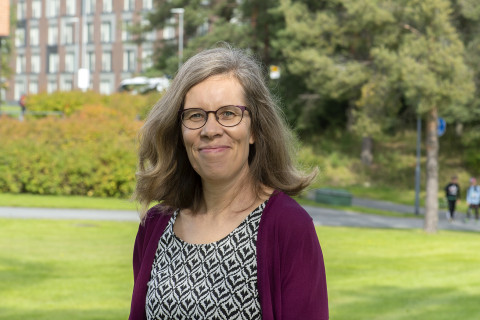Language change is a never-ending source of research
The diversity of language is fertile ground for research. Year after year, we get delighted, angry and interested in changes that take place in our language.
“Language is such an integral part of our identity that it is important to have current knowledge on where it is heading,” says Hanna Lappalainen, who was appointed as Professor of Finnish Language at the University of Eastern Finland this August. A specific focus of her professorship is on spoken language variation.
She is pleased about the University of Eastern Finland opening a professorship that is dedicated to language change and variation.
“My own research focuses on variation in the Finnish language, and on the views and attitudes associated with it. I’m interested in language change at the level of individuals and communities. In recent years, much of my research has also focused on address practices, such as polite forms and first name usage.”
Lappalainen says she identifies as a sociolinguist.
“Sociolinguistics studies language change and it is a never-ending and inexhaustible source of research; after all, language is constantly changing. As a field of research, however, sociolinguistics is still relatively new, and it hasn’t been until now that suitable materials for sociolinguistic research are starting to become available.”
Interested in spoken language
As a linguist, Lappalainen gets easily excited about various language-related questions – of which Finns have plenty. The practices of addressing other people is something we don’t get tired of.
“In fact, I have chosen some of my research topics based on what people are interested in and want to know more about.”
Lately, these topics have been related to, for example, linguistic biographies, language change at the level of individuals, language spoken by young adults in the capital region of Finland, and service encounters at the Finnish Social Insurance Institution, Kela. In addition, Lappalainen has worked in expert capacity in the recent UT2020 project translating the New Testament into Finnish and making it available on mobile devices.
Lappalainen is also the editor of a book on address practices, and another on interaction at kiosks.
“My career as a researcher started from studying dialects. That is why I hope to continue dialect research in the footsteps of Marjatta Palander here in eastern Finland. I feel that the University of Eastern Finland has a responsibility to study the dialects of eastern Finland, and I want to be strongly involved in that.”
Lappalainen’s parents have roots in eastern Finland, and cherishing those roots is easy in these parts of the country. Indeed, together with her students, Lappalainen is already enthusiastically organising a trip to Savitaipale, a countryside town in south-eastern Finland, to collect samples of the dialect spoken there.
“I want to involve students in research as much as possible. Overall, I see education and research as a closely knit package rather than as separate entities.”
She attaches equal importance to the dissemination of research results to the general public.
“The latest opening on this front is the Murremyytin murtajat (‘dialect myth busters’) podcast, which I produce together with Professor Johanna Vaattovaara.”
Can social class be heard in speech?
At the moment, Lappalainen is fascinated by the relationship between social class and language use. With inequalities in income and between people increasing also in Finland lately, attention is now being paid to class distinctions.
“Preliminary findings have led many to believe that class distinctions are reproduced in speech. At the moment, however, we do not know how to differentiate those distinctions, or in which features of speech they appear. “
This is an important topic because it shapes our views of one another.
“I hope our project gets funding so that we can study this theme, which is very topical in our society, as well as multidisciplinary. There are many hidden elements in language that should be made visible so that we don’t draw false conclusions about each other's background.”
Murremyytin murtajat podcast (please note that this podcast is in Finnish)
HANNA LAPPALAINEN
Professor of Finnish Language, especially spoken language variation, 1 August 2021–, University of Eastern Finland
Born in 1971, Kokkola
PhD, University of Helsinki, 2004
Key roles:
Professor of Finnish Language, especially spoken language variation, 2021–, University of Eastern Finland
University Lecturer of Finnish Language, University of Helsinki, 2012–2016, 2018–2021
Deputy professorships in Finnish language, University of Helsinki, 2016–2018
Researcher, Institute for the Languages of Finland, 2004–2011
Assistant, University of Helsinki, 1995–2004
Editor-in-Chief of the Virittäjä magazine, 2017–
Print-quality photos of Hanna Lappalainen are available at:
https://mediabank.uef.fi/A/UEF+Media+Bank/43776?encoding=UTF-8
https://mediabank.uef.fi/A/UEF+Media+Bank/43777?encoding=UTF-8



